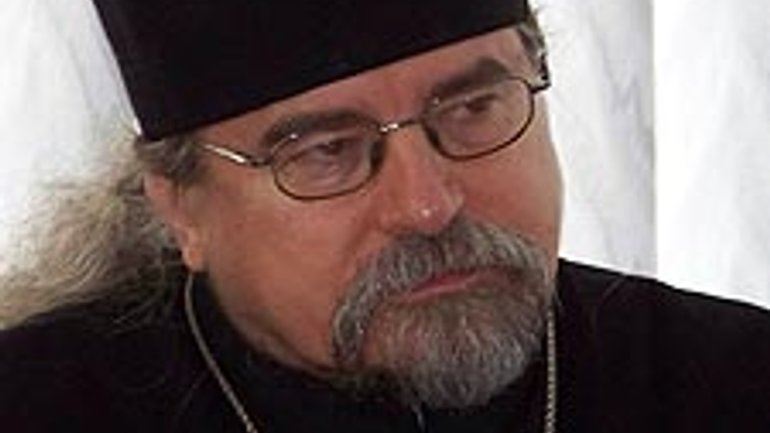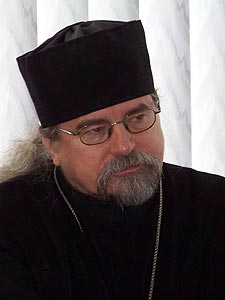Archbishop Ihor (Isichenko): 'The cause of the Holodomor stems from communist doctrine: If the enemy does not surrender, he must be destroyed

 Interview with Archbishop of Kharkiv and Poltava Ihor (Isichenko) about the Holdomor of 1932-1933, its effects and what should be the memory of the tragedy
Interview with Archbishop of Kharkiv and Poltava Ihor (Isichenko) about the Holdomor of 1932-1933, its effects and what should be the memory of the tragedy
— Today, we often hear the thought of how God could have allowed the Holodomor. Others say it is a punishment for sin. Is there a theological understanding of a horrific event like the famine?
— Christian theodicy comes from the fact that the infinitely good God does not do evil. Evil appears where a person opposes God, commits rebellion against him, carelessly seeks to create his own, alternate world — without God, without the values of the Gospel.
The Holodomor is not an isolated episode from our past. It logically follows from the communist doctrine, clearly articulated by Maxim Gorky in the title of his classic article: "If the enemy does not surrender, he must be destroyed." The world of traditions of Ukrainian village life, firmly rooted in Christian morality and the rhythm of church worship, was hostile to the Bolshevik utopia. Therefore, it was doomed to destruction from the moment when the Red Army troops crossed into the Ukrainian People's Republic. Lack of organized resistance to the invaders, public apathy, belief in propaganda of promises of land to the peasants or "Ukrainization policy" created the preconditions for genocide. Although the Holodomor of 1932-1933 was the most bloody episode of genocide, it is possible to understand and appreciate it only in the general context of confrontation of the Red dictatorship and its brutal uprooting of Christian elements of our national life and their carriers in society.
— In the twentieth century, other peoples also endured mass destruction, genocide – Jews, Armenians. Is it possible, in this case, to draw parallels between the Holodomor, the Holocaust and the extermination of the Armenians?
— Yes, of course. Genocide in all these cases was similarly directed against ethnic communities that their ruling regime saw as an obstacle to the creation or preservation of empires — Ottoman, Nazi, Soviet. The root of the conflict is hidden not in the political self-organization of the destroyed ethnic group, but its way of life, morality, conscious or subconscious sense of national identity. And every time the organizers of genocide demonstrate separation from their own religious traditions – whether Christian or Jewish (Nazis, Communists) or Islamic (Mladoturks).
— Eighty years have passed since the Holodomor. Has Ukraine recovered from this tragedy, in particular at the mental-spiritual level? Are the consequences of fear still felt?
— It would be useful to compare maps of national losses during the genocide of the twentieth century with maps from 2004 of electoral sympathies of different regions of Ukraine. I would not be surprised if blue or red colors dominate in areas that were decimated in the interwar period from political repression and famine. Ideological indoctrination, coupled with the experience of danger of starvation, which was fixed in the genetic memory, is a powerful psychological weapon. The descendants of those who perceived the Soviet occupation in 1917-1920 as an absurd coincidence for decades mastered the difficult science of surviving in the empire of evil. They learned to adapt, to hide their thoughts, always keep food for a rainy day, to keep in the pantry a bundle of crackers and clean linen. They lost the habit of helping each other, sharing with the poor, protecting the innocent downtrodden. Spiritual healing of generations requires time, credible public leaders and institutions, economic justice. As every ill person, these people need benevolent attention, love, and understanding. That is what lacks in the post-communist society.
— Maybe because Western Ukraine did not endure the Holodomor of 1932-1933, there it is much more painfully perceived than in the East?
— I would not want to compare where the Holodomor of 1932-1933 is perceived more painfully. Neighbors can more loudly lament the loss by a mother of her only son, but petrified with grief the mother experiences this loss immeasurably deeper. For Galicians the Holodomor became a public drama, an expression of brutality from the communist regime. For us, eastern Ukrainians, it is a deeply personal tragedy that touched almost every family. From it one could hide behind propaganda mirages, it could be forcefully erased from historical memory, but the scars from it always remained in every soul. And even though one could not speak for years about the Holodomor with strangers, it does not mean that it was lost or that it lost any of its severity. My 84-year-old father will never forget the dead bodies, which he had to pass by on the street, or the death of his grandfather who was exhausted from hunger...
— From whom did you first hear about the horrors of the Holdomor, from your father?
— No, from my grandmother. She preferred to talk about it when we were alone and was accustomed to never talking about it with strangers. These memories were something deeply hidden, not for outsiders. Moreover, sharing them with unknown persons was actually dangerous. I remember later at a folkloric practice (in 1975) an old villager, who had started openly telling us students about the Holodomor, noticed that one of the girls was quietly writing something. How he ran away from us!
— Now you can talk about the Holodomor openly. However, those who survived it prefer to remain silent. What do you think is the reason?
Victims of famine, like any disaster, remain psychologically scarred from it and do not want to go back to their memories, again and again experiencing the pain of loss, the feeling of helplessness. And also there sometimes is the disbelief in the sincerity of the interlocutors and the reality of social change in Ukraine. Living mainly in regions led by politicians with a pro-Soviet orientation, our veterans do not feel free from the authority of the Communist bureaucracy. And so they stay sensitive, trying not to say things for which in the old days they would have been punished. In addition, they instinctively flee from attempts to exploit their sorrow for political purposes.
— Bishop, please say then how the Holodomor should be marked at the state level? What should be done for the victims of this tragedy to be honored and for those living to learn from it?
— The memory of the Holodomor must first be freed of political speculation: advertisements on the background of crosses to the victims of the national tragedy, construction of monumental structures with money from a miserable budget, organization of noisy processions. The only worthy monument to the memory of the millions of victims of the genocide of the twentieth century is the creation of a national state capable of taking care of the health and safety of its citizens, free from the domination of aggressive ideologies and party or clan voluntarism, sensitive to public opinion. We should all unite around the creation of this monument.
The Day of Remembrance of the Holodomor and Political Repression seems to me a day of peace and meditation, for Christians a day of memorial prayers. Meeting with the memory of the victims should be primarily individual, spontaneous – in a church, or at home near a memorial candle, or near a memorial cross. To the living, the lesson from the cruel experience of genocide experienced by Ukrainians is the unacceptability of apathy, tacit acquiescence to evil, willing or unwilling assistance to foreign aggression. Without mastering the art of national solidarity, built on the solid foundations of Christian brotherly love, we can never feel secure from the threat of new genocides.









